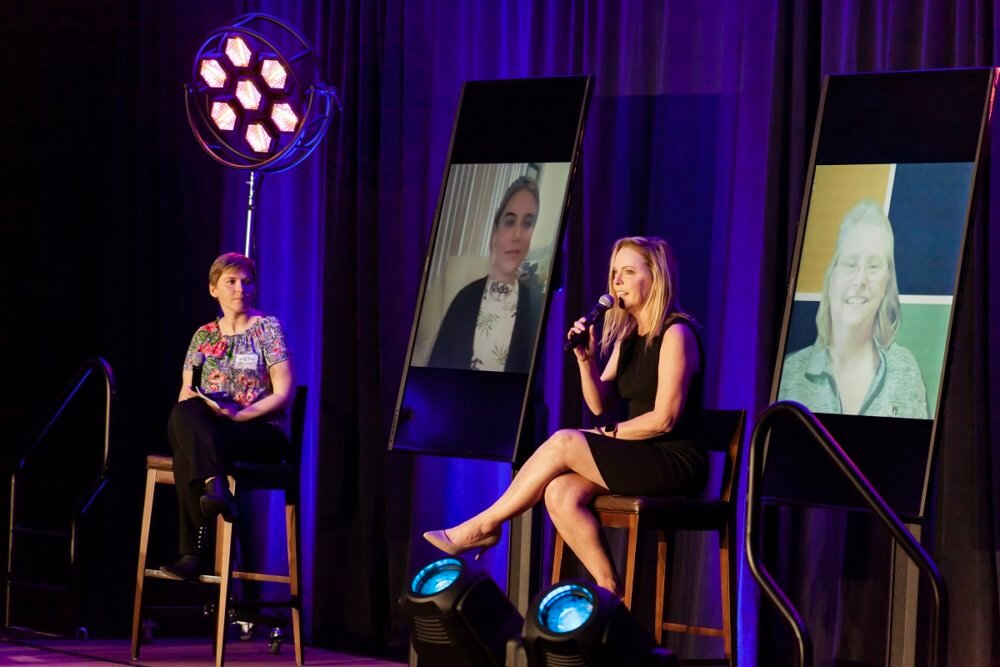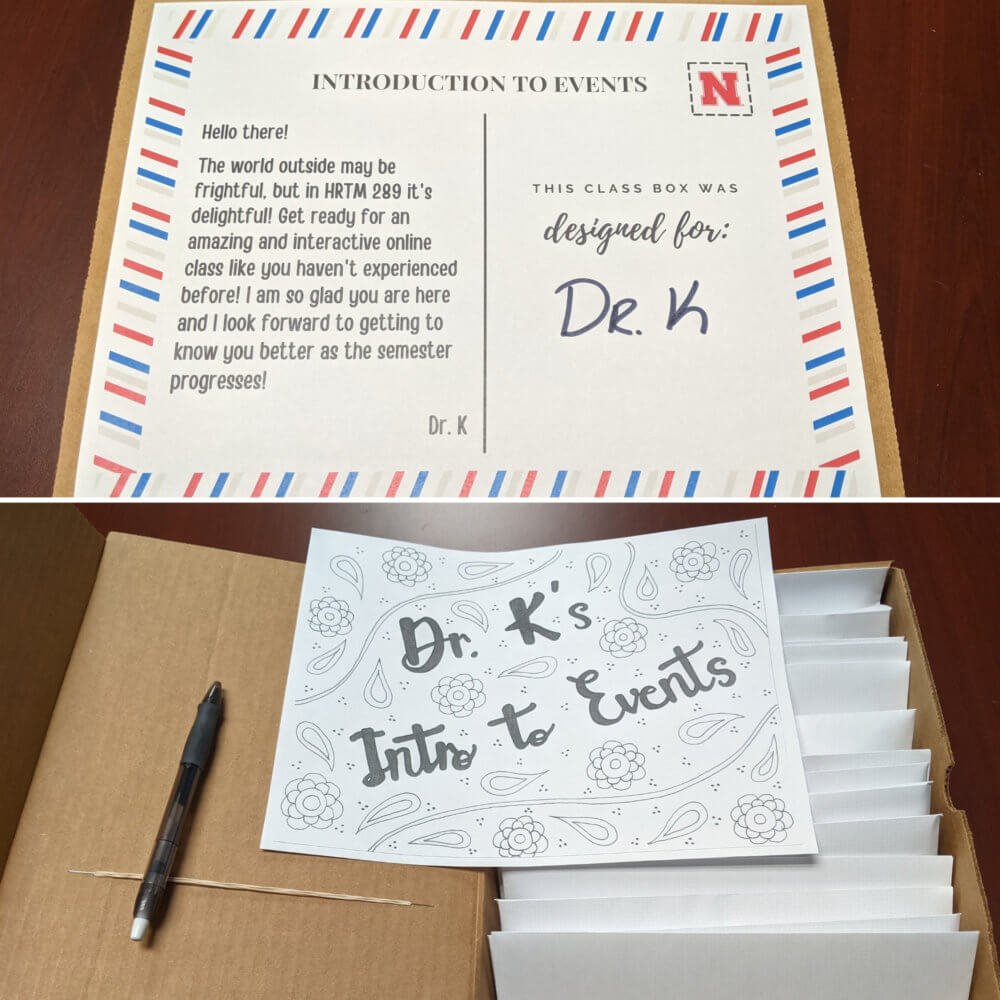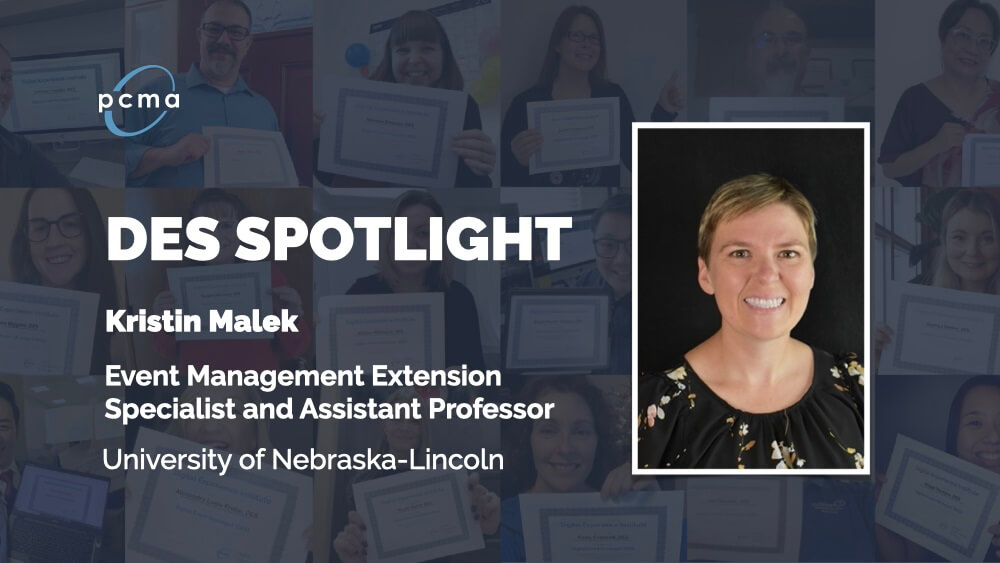Class is now in session. Digital events are nothing new to Kristin Malek, Event Management Extension Specialist and Assistant Professor, University of Nebraska – Lincoln. Having been certified as a Digital Event Strategist since 2017, Malek recertified in 2020, just in time to put her background to good use. As virtual events took a dominant role in 2020, Malek was ready to ace anything life threw at her, including a successful hybrid event done with her students that reached six countries and 16 states. This is her story.
Tell us a little bit about what you do and what made you pursue DES in the first place.
I’m a faculty member teaching event management and event design at the University of Nebraska-Lincoln. I have been doing research on the future of virtual events since 2013, and I’ve been doing research on the return on investment of engagement and its impact on learning since 2014. When I found out about the DES certification in 2016, I applied for a scholarship sponsored by Meetings + Conventions Calgary which I’m very thankful to have gotten. I took the course in 2017 and got the designation, and I recertified in 2020.
Recently, your students and you pulled off a successful hybrid event for meeting planners with six countries and 16 states represented. Tell us a bit about the event.
The event was called “Level Up Your Event Game” and it just took place on April 1, 2021. This was a hybrid event for meeting professionals, planned by my Advanced Event Operations class at UNL (University of Nebraska-Lincoln). Because this was a hybrid event, we were able to pull in international speakers and international attendees.
It was dual purpose. One was to give students the opportunity to design, plan and execute this amazing hybrid event, and two, the students also got all of the information in addition to being able to network with all of these global meeting professionals.
As you can probably tell from the name of the event — “Level Up Your Event Game” — the event had a gaming theme which was really fun. We had about 40 people attending face-to-face and just over 100 people attending online. We ended up having 16 states and six countries represented. When the students saw the metrics, they all went, “Wow, that’s so crazy!” It was more successful than our original expectations.
For the program, they planned four different content tracks to include personalization and engagement, marketing, technology and wellness/life skills. The in-person experience incorporated all four of these tracks. Online attendees could also pipe into the in-person room at any point in time.
We had a keynote panel that I modeled after the PCMA’s Convening Asia Pacific meeting where remote speakers were displayed on the huge screen on stage. For the panel, we had two people in person — one moderator and one panelist — and two panelists online. We had so much engagement from inside the room and online — over 400 chat messages in one session!

For a panel at the event Level Up Your Event Game, two people presented in person — one moderator and one panelist — and two panelists participated online. (Photo/James Lindsay of Kim Yung Creative)
Our production partner, Inspirmedia Productions, offered to set up a whole LED wall behind the stage and to do something very similar to the scale we saw at Convening Asia Pacific and Convening Leaders. But the students and myself decided against it, because if we’re trying to help educate the average meeting planner, not everybody has the money for a full LED wall. This was one of the big reasons why we did the TV screens like you see in this picture: TV screens are easy to rent, and they’re relatively less expensive. We wanted to show everyone how much of a difference this simple tweak could make rather than having the crazy $100,000 LED screen which was offered to us, which might not be seen as relatable for our particular target market.
A few meeting planners who attended the event reached out to me afterwards and asked if they could hire some of our students. One of our panelists reached out to our event leader and said, “I heard you’re graduating in May. Do you want to come work with us?”
The key takeaways for me as the teacher was just seeing my students’ confidence grow. For many of the students, it was the first time they had planned an event from start to execution to debrief. Several of the students said that they now have the confidence to know they can make it in this industry. One of the event leaders said, “I realized that I’m not just a student learning about events; I’m an event planner that just happens to be a student right now.”
I realized that I’m not just a student learning about events; I’m an event planner that just happens to be a student right now.”
As a long-time DES, when you were guiding the students through the process, were there any key take-aways from the DES certification that you found especially important for the students?
I always focus on the attendee experience journey. We use the Event Design Canvas in my courses to craft the experience journey for both the in-person and the online attendees and complete the empathy mapping, so the students have a whole research process they have to go through before they even start to think about a program.
For students, it was interesting when they recognized they can’t just take what’s done in person and put it online. In my Introduction to Events course, I would ask them, “Think about your least engaging courses. Is it just someone who took their PowerPoint slides from an in-person lecture and put them online?” Most of the time, it is. And then I’d ask again, “Think about your most engaging course. What did the professor do that was different?” Students would then start realizing that they have actually been attending online events. By asking these questions, students are encouraged to take the things they love the most about their own online education experiences, research additional information and other ways, and then apply them to their online experiences they are creating.
In addition to the actual DES course, I’ve picked up little things from PCMA throughout the years. For example, at Convening Asia Pacific last year, I was in a conversation with Sourabh Kothari, one of the instructors of the DES course. He talked about how he intentionally structured an extra hour exclusively for online attendees before the in-person program began. I thought that was a fantastic idea and strategy, and that’s exactly what we did at Level Up Your Event Game. We started the online experience an hour before prior to the in-person program with a lot of interaction and icebreakers. To take this up one level, we displayed this on a 16-foot projection screen in the physical room. As the in-person attendees trickled in from registration, they saw all the online interaction already happening as part of the event. It was definitely engaging for both the in-person and online attendees to see the connections of both worlds.
Nothing’s ever brand new in this world. We’re just taking concepts from different things and then trying to elevate them to another level. A lot of my students had attended Convening Leaders before this semester started and they were able to take those learnings into planning this event as well.
Personally, the DES course has also helped me with online speaking and moderation. I’m constantly serving as a facilitator or moderator between online and in-person, and DES has really helped me navigate between and integrate the online audience with the in-person experience. I was invited to speak at a hybrid session at MPI’s World Congress in 2018 after getting my DES in 2017. I remember actively talking to the online audience as well as the in-person. It’s now critical in the hybrid world for both attendees to feel like they’re part of the event, that they’re both in the room.
Having trained facilitators who are comfortable with addressing both the online and in-person attendees is very important. And it has very little to do with technology; it’s rooted in the event design process.
Totally. Technology is but a means to an end. One time, I was working with a group who were planning their event for 350-400 people. It was their first time going from in-person to online and they were about to spend $20,000 on a platform. I said, wait, what’s the purpose of your event? What’s the why? Who are the attendees? After they answered, then I said, now let’s look at your platform.
They then realized based on their purpose and that their attendees were all internal, instead of spending $20,000 on a new platform, they could do it effectively through Zoom with a Splash event page and integrating with other free platforms. It was hugely successful, and a lot of the attendees said it was the best event they had been to.
Everyone wants the shiny new platform, and everyone thinks that the platform or the technology is going to carry their event, but let’s focus on the purpose, the why, the content and who are the people in the room, and then design an event for them that takes into consideration their 360 whole person and not just their professional skillset. That’s why I love PCMA so much because PCMA has always been a leader in quality content and education. That’s why I’m such an advocate.
Can you talk a little bit about convincing universities to support faculty members to take the DES course?
Every faculty member has their own niche area and job description, and not every university or college is made the same. Just like meeting planners — there are association planners, corporate planners and government planners, we have the same within the university system. There are different educators that do different things, Because it’s so varied, a university normally gives each faculty member a set amount of professional development funds, and it’s up to the team member to prioritize what to spend it on.
I was really appreciative to get the Calgary scholarship for DES, because I was then able to use my funds towards attending Convening Leaders in person.
As an educator, why is it important to understand digital engagement? Online education providers abound such as Udacity, edX, Khan Academy, Udemy. How do you see traditional educational institutions should evolve?
When designed properly, classes are really nothing but an event. Events are defined as two or more people coming together for a common purpose. A class is two or more people coming together for a common purpose, and in this case, it would be that day’s learning objectives. When designed properly by the faculty members, each class should really be a unique experience based around the learning objective of that day. This is also true online.
As an example, I taught an Intro to Events course online last fall due to COVID. Because of the engagement and the activities, there was a lot of positive word of mouth and social media buzz around my class. As a result, my enrollment grew 208% from the fall to the spring semester. A student enrolled in this course actually lives in Netherlands — there are lots of schools in the Netherlands; she’s not going to move to Nebraska to take my course in-person, but because it’s now online, she can after she sought it out.
As the world goes more digital, I truly believe that education has to follow suit to remain competitive. As online reviews, social media, and word of mouth spreads about amazing online experiences, the reach of excellent program offers will also spread. On the flip side, unengaging programs will just die. Faculty brands will be even more important than just the university brands; people are seeking out teachers known for engaging classrooms, and these classroom experiences will be so different than just the name on the piece of paper from their local school. I think there’s going to be a lot of evolvements and a lot of fun.

Kristin sends her students a Meeting Box before the beginning of each semester. In the box, there’s a series of envelopes from week two through week 16. They’re all sealed with labels for each week. Kristin opens each envelope with her students together as the semester progresses. In-class activities are built around the content in each envelope. It builds an amazing sense of community within the cohort, she says.
As an educator particularly in hospitality & tourism training future leaders in the business events industry, what role will the skill of digital events play in students’ career development?
I’m a little different than most teachers in event management. I have said for years that the event industry is going to split into two: those that do logistics, and those that focus on design and strategy. There’s nothing wrong with either of those, but those who focus on design and strategy are going to earn significantly more money, provide more value, and to be in the C-suite.
Now, most higher education event programs are structured so that the undergraduate degree is focused on logistics and the graduate program is focused on design and strategy. I wholeheartedly disagree with this approach. In my Introduction to Events class, I start with design and strategy because these elements should be taken into consideration at the beginning, and they should dictate the logistics.
As the world evolves, digital skillsets will be essential for all students’ career development. You’ll need to know how you can best utilize these digital platforms to maximize your effectiveness. You’ll also need to understand not every event should have a digital component; some events should just be niche, exclusive in-person experiences.
The Digital Event Strategist Spotlight series features Digital Event Strategists and how they are making impact in their work through digital and hybrid events.
For inquiries about the Digital Event Strategist certification, please complete the form.

